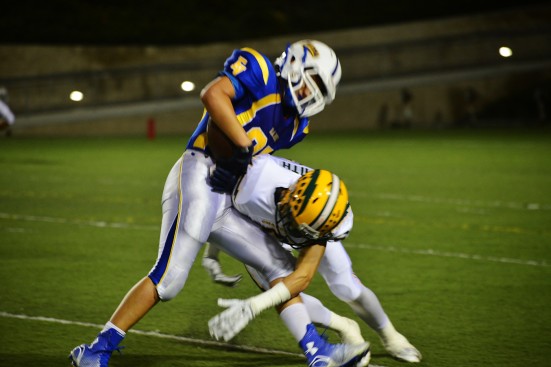
By Heather Carr, staff writer
Throughout the fall, FVHS athletes from each sport will participate in the annual baseline concussion test, imPACT, an online neuro-cognitive test.
The test was designed so doctors and physicians can compare scores from previous years with future scores. Professionals are able to mark noticeable changes in students’ word-image processing and reaction speed that may signal the development of a concussion.
According to first-year athletic director Dennis Piramo, the testing, which began last year at FVHS and around the district, was implemented in response to a growing awareness of the damaging impacts of collision sports across the country, particularly in football and soccer.
“I knew they did it last year, but the year before they did not, so I think that CIF just adopted it a year ago,” Piramo noted. “I think we needed something as a baseline all over CIF because concussions are becoming a lot more apparent across the country, so I think we needed something to regulate it, and that’s what imPACT does.”
The imPACT test takes approximately thirty minutes to complete and involves a series of memory-targeted features, which includes attempting to memorize 12-20 words or shapes on one page, then determining which were present on another page.
A similar test shows three letters, then switches to a screen of randomly mixed numbers from 1-25. Student must click the numbers in descending order as fast as they can before proceeding to another screen and typing the three letters from the start.
The types of tests included have caused a few athletes to express frustration for what they viewed as a particularly difficult assessment.
“I thought it was very, just…confusing,” Chloe Arceneaux (’19), a member of the girls cross-country team, stated. “Some of the things were a bit confusing, and it is kind of hard as the test progresses ’cause there is more things that you have to remember…I mean if you already have not-that-good memory, then it shows just that it’s not very accurate in that, but like, I guess it’s pretty accurate…to see if I’ve ever had a concussion and like, see like, the transition when I have a concussion and afterwards.”
Carolyn Ta (’16) from the girls tennis team believes the test is difficult, but inaccurate.
“…I know is it is a very hard test, it’s not a reasoning test like the SAT or something, it’s more of like a how-fast-you-can-react-something, and it gives a lot of room for error,” Ta stated. “I don’t really think it’s accurate because people kind of look at it as how fast they can finish it more than how accurate they can do it.
However, there were also those who thought the test was not difficult yet accurate in measuring a student’s baseline.
“I wouldn’t say that the concussion test was hard, probably just medium at most,” said Danielle McClements (‘18) of the girls cross-country team. “It had parts that challenged your brain a bit, but nothing too bad really. I would say that this test was pretty accurate for athletes.”
“I don’t know much about how all of it works scientifically, but I understand the gist of it and realize that it’s important to compare past and present results in order to find out if there’s a problem with an athlete down the line. Hopefully that’s not the case!”





